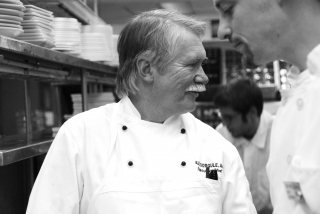
Teaching Them to Fly
06 June 2022The teaching cycle of training new students to fly into the culinary world and the joy that comes with it.
By Paul Sorgule, MS, AAC
Feedback & comments: This email address is being protected from spambots. You need JavaScript enabled to view it.
Each spring in my home, we move certain plants to our porch to enjoy the fresh air and gain the strength necessary to make it through the next winter. Each year, our very large Staghorn Fern moves into its spring/summer home hanging from one of our roof beams adjacent to giant white pines that are in clear view of a beautiful Adirondack Lake.
Like clockwork, a pair of robins sets up camp, building a nest and starting a family. We watch carefully over the next two months as light blue eggs are warmed by the mother robin while dad remains perched in the white pine, standing guard. Soon the eggs begin to crack and hatchlings who can’t even open their eyes appear with open mouths waiting to be fed. There is dependence and trust, a desire to learn, and a real need to find independence over the next month or so.
Their feather cover arrives, their eyes open, their wings begin to flap, and parents go through the process of teaching them to fly, find food, and nest build, while exposing them to the intricacies of being on their own. The trust newborns have for their parents and teachers is now reversed. The parents must now trust they did their job and their offspring will thrive and live a successful life.
It is at this time of year I always seem to become nostalgic. I think back on 30 years of my classroom students who came, studied, listened, challenged me, grew, and then left the nest for a lifetime of opportunity. Educators play such an important role in the lives of students who come into our world as novices. We welcomed freshmen with a desire to enter this culinary world, the need to build their portfolio of skills, and a need to discover how to work with others in the pursuit of excellence. They had an underdeveloped sense of direction in their careers and an abundance of trust in us.
If we did our job properly, then there was a sense of completeness. We prepared them to move in the right direction. We helped them build that portfolio of skills. We instilled a desire to do things properly and passed on the knowledge that teamwork is the only way to reach any level of success in the food business. We watched them empty their lockers and stood tall as they cleaned the kitchen one last time. We smiled and nodded with approval as they walked across the stage and collected their diploma or certificate. Tomorrow, a new group of eager freshmen will take their place and our work begins again.
It is an incredible responsibility that every educator shoulders. It’s a responsibility that taps into our skillsets as chefs, educators, mentors, managers, leaders, confidants, and sometimes hard-nosed realists. The responsibility that understanding sometimes it doesn’t work out, but oftentimes does. We do our best to be like those parent robins preparing the next generation to fly. This is what we do.
Enjoy your summer. The nest will soon be full again.
PLAN BETTER – TRAIN HARDER
Paul Sorgule, MS, AAC, president of Harvest America Ventures, a mobile restaurant incubator based in Saranac Lake, N.Y., is the former vice president of New England Culinary Institute and a former dean at Paul Smith’s College. Contact him at This email address is being protected from spambots. You need JavaScript enabled to view it..
